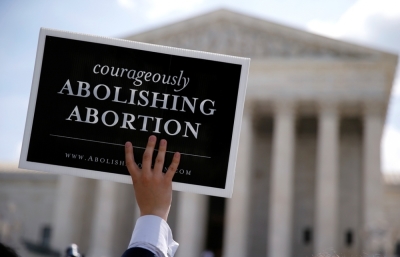GOP Congress Learns to Fight for Life

On January 22, just days after the swearing in of what some called the most pro-life Congress in history, the House of Representatives was poised to vote on the Pain Capable Unborn Child Protection Act. The bill would limit abortions after 5 months of pregnancy (20-weeks) based on evidence that fetuses can feel pain at that point in pregnancy.
But the long-scheduled vote was abruptly cancelled when several Republican congresswomen protested the inclusion of a provision requiring rape victims to report the crime to police before obtaining late-term abortions.
Republican leaders seemed not to have anticipated objections from within their caucus over the bill's language, perhaps because a similar version had passed the House two years earlier.
The debacle left abortion advocates emboldened and pro-lifers, hundreds of thousands of whom had descended on Washington, D.C., for the annual March for Life, wondering how Republicans had managed to botch a vote on a bill that enjoys the support of two-thirds of Americans. As one pundit put it, "We have a Republican Congress that doesn't believe it's competent enough to make a case against infanticide."
Three months is an eternity in politics. And in that time Republicans seem to have rediscovered their courage when it comes to defending unborn human life, even when confronted with cowardly attacks by Democrats.
On Tuesday Republican leaders in the Senate struck a deal to pass the Justice for Victims of Human Trafficking Act. The bill would increase penalties for those involved in human trafficking, and provide financial restitution to the victims.
The bill passed the House in late January and sailed through the Senate Judiciary Committee in February.
The Senate was on track to pass the bill and send it to President Obama's desk when abortion advocates began to complain loudly about language barring the victim-restitution fund from paying for some abortions.
Abortion advocates' objections didn't make much sense. The bill's abortion language was the same as that used in the Hyde Amendment, which restricts taxpayer funding of abortion to cases of rape, incest and when the life of the mother is in peril. It has routinely been attached to government spending bills for nearly 40 years.
Polls consistently show that roughly two-thirds of Americans oppose taxpayer funding of elective abortions. Even journalist Eleanor Clift dismissed the concerns of her fellow abortion advocates. "Democrats lost the debate about the Hyde Amendment 40 years ago," she wrote.
But none of that seemed to matter. Whether Democrats simply hadn't read the bill (as some claimed) or changed their minds after abortion advocates conveyed their outrage (more likely), the result was that a once-bipartisan and overwhelmingly popular bill to assist the victims of modern slavery was on the verge of being defeated. Democrats began to filibuster the bill.
Perhaps Democrats were wagering that, given how quickly Republicans had abandoned the 20-week abortion limit in January, GOP leaders would quickly eliminate the abortion language in the trafficking bill.
If so, they were wrong.
Senate Majority Leader Mitch McConnell responded by announcing that he would not call a vote on Loretta Lynch's nomination to replace Eric Holder as attorney general until the Democrats dropped their filibuster.
With the nomination of Lynch, the first black woman ever considered for the job as the nation's top law enforcement officer, in limbo, the left resorted to smearing Republicans as sexist and racist.
NARAL tweeted, "Anybody else notice that only men are supporting #antichoice restrictions in a #humantrafficking bill? #StrikeTheBan #GetReal." Washington Senator Patty Murray, joined at a press conference by six other her female colleagues, said, "It's time for the majority leader to release the hostage."
Illinois Senator Dick Durbin accused Republicans of forcing Lynch to "sit in the back of the bus," a reference to famed civil rights activist Rosa Parks' refusal to move from the whites-only section of a bus in Montgomery Alabama in 1955. Other Democrats also alluded to racism as the reason for the hold up.
But Republican leaders refused to give in, even as Senate Democrats filibustered the bill five times and as Lynch's nomination continued to languish.
Finally, on Tuesday, Senate Democrats agreed to a solution ensuring that no funds provided for trafficking victims will be used for most abortions, under the Hyde amendment. The Senate passed the bill 99-0 on Wednesday, and President Obama is expected to sign it into law soon. (Lynch, meanwhile, got her confirmation vote in the Senate on Thursday.)
This was a hard-fought win and, one hopes a preview of things to come from Republicans in Congress. Their steadfast support for unborn children and the victims of modern slavery is an important indication of what they can accomplish when they fight for their deepest values.





























